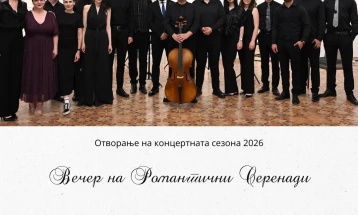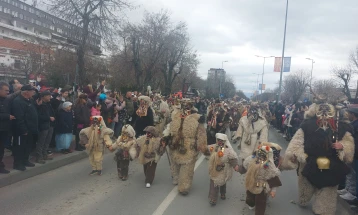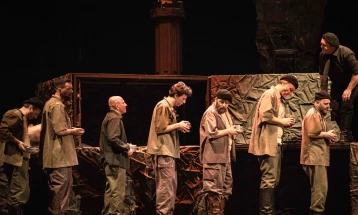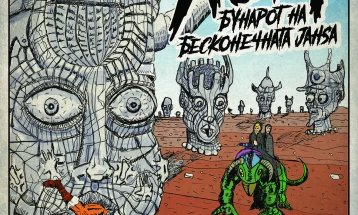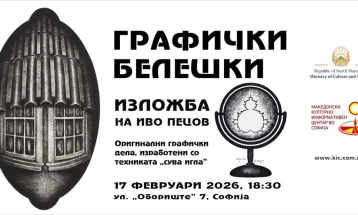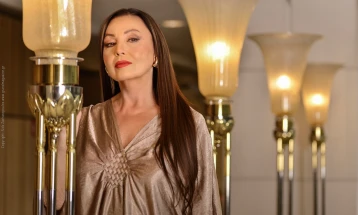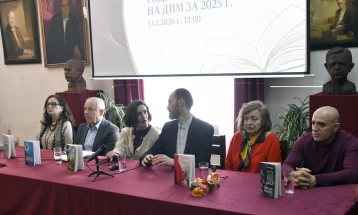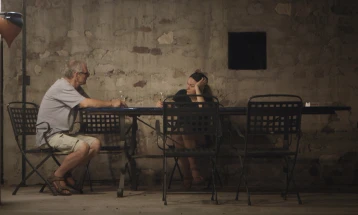Art exhibition "Rise and Fall of Skopje": Important to have solidarity and compassion towards fellow citizens
- After 26 July 1963, Skopje began to create opportunities for telling different urban stories of modernity. The world answered "You are not alone, we will build you back up". Skopje saw a lot of heroes, friendship and love. The lesson from the tragedy of the earthquake is that the most important thing to have is solidarity and compassion towards our neighbors and fellow citizens.
- Post By Ivan Kolekevski
- 17:16, 26 July, 2023
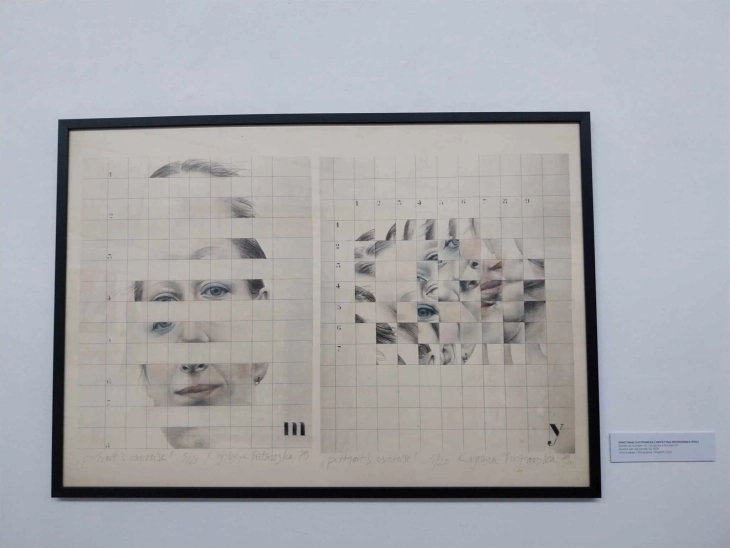
Skopje, 26 July 2023 (MIA) - After 26 July 1963, Skopje began to create opportunities for telling different urban stories of modernity. The world answered "You are not alone, we will build you back up". Skopje saw a lot of heroes, friendship and love. The lesson from the tragedy of the earthquake is that the most important thing to have is solidarity and compassion towards our neighbors and fellow citizens. These were some of the messages that were conveyed during the Wednesday opening of digital art exhibition "The Rise and Fall of Skopje" by the State Archives at Skopje’s Museum of Contemporary Art.
The exhibition was organized by the Ministry for Culture within the framework of manifestation "Skopje at five seventeen - 60 years earthquake".

Minister of Culture Bisera Kostadinovska-Stojchevska said in her address that after the fall, Skopje began to rise. She reminded that Skopje was given a helping hand by world-renowned architects and builders, and that Skopje was rebuilt shoulder to shoulder by the residents and foreigners, who because of the tragedy remained our friends forever.
"At 5:17 am, sixty years ago, Skopje collapsed before the world. The world collapsed for the people from Skopje. Skopje was in ashes and ruins. Death came for Skopje, but it never admitted defeat. Thanks to its citizens, thanks to the brave people and their friends, thanks to the goodness and solidarity of humanity. The world answered 'You are not alone, we will build you back up.' And in those painful moments Skopje witnessed the exceptional human virtue, a value that the world need more and more," Kostadinovska-Stojchevska said.
She informed that Skopje lost 1,070 of its inhabitants and almost 80 percent of the homes and infrastructure.
"Skopje saw this as a new beginning. Many countries answered the call from the United Nations and helped to confirm their friendship. Even today we are very grateful to them. No one can and should not be alone. Skopje saw many heroes, friendships and love," the Minister added.

President Stevo Pendarovski said that he wished the memorial for the 60th anniversary of the earthquake be dedicated to the meaning of humanity and people's will, to bridge all temptations and have the capacity to overcome, even when injured, the pitfalls and obstacles along the way.
"Every person and community remembers the pain and loss. But at the same time, there are also the starting points for our transformation into a new constructive narrative, which will help redefine life's priorities. We have such a moment in our history, the 1963 earthquake. That is a place of great, intimate human loss and collective trauma, a place of devastation and death, but also a place for reflection and confronting the importance and meaning of live," Pendarovski said.
As he pointed out, that moment of dying soon becomes a moment of birth, a realization that the city and community should be rebuilt through solidarity, empathy, community to overcome the ruins of life.
"The earthquake of '63 reshaped the economic, political and cultural structures and the rest of the city forms inherent for urban living. When an elementary accident interrupts the flow of life we say that violence has occurred. However, if with extensive work we try to look over the horizon of suffering, we can find several points for new beginnings and new hope," Pendarovski added.
The President also said that after 26 July 1963, Skopje began to create new opportunities to tell different urban stories for modernity.
According to him, one lesson that came from the tragedy is that the most important thing is to remain in solidarity and be compassionate towards our neighbors and fellow citizens, and at the same time open to new urbanization and new ideas in order to create a living environment in which we will be free and respected.

Polish Ambassador to North Macedonia, Krzysztof Grzelczyk, stated that the memory of the tragic earthquake of 60 years ago, is still alive among Macedonians.
"It is worth remembering that the United Nations created a special programme for the reconstruction of Skopje, led by a Polish architect. Architects and urban planners such as Stanislav Jankovski and Kenzō Tange shaped and set the foundations for Skopje's development in the following decades. Some countries on their own initiative began building temporary homes and provided humanitarian aid, and in the following years built hospitals, schools and other public facilities. A good example is the Museum for Contemporary Art which was a gift from a Polish architect, but also a large part of the collection is composed of artists from other countries," emphasized Ambassador Grzelczyk.
He said this does not only show the respect between the Macedonian-Polish cooperation, but that it is also the attitude of the entire international organization in the face of a tragedy that affects one of the members of the community. This is, as he said, the human dimension of solidarity.
"Even today, when facing other challenges, we assure you of our solidarity with the Macedonian people," he added.
At the end of the ceremony, Minister Bisera Kostadinovska-Stojchevska awarded the ambassadors from the donor countries certificates of appreciation. ssh/ik/
Photo: MIA, screenshot
